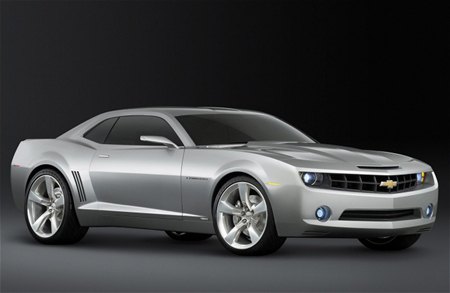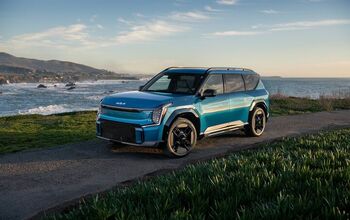General Motors Death Watch 118: Too Much Too Little Too Late
When Car Czar Bob Lutz told the world that GM was putting the Zeta platform on hold, it was the second time the rear-wheel drive (RWD) program had been chopped. Two years ago, GM killed Zeta for being too pricey. Less than half a year later, the RWD program was resurrected; working with GM’s Holden division supposedly made it feasible. When Bob announced GM had second thoughts about its second thoughts, he blamed the double volte-face on government fuel economy and emissions legislation. In fact, there’s both less and more to this decision than meets the eye.
First, understand this: the regulations in question have yet to be finalized, let alone codified. While politicians have discussed the possibility of increasing federal CAFE (Corporate Average Fuel Economy) standards, no changes have been made. And while the Supreme Court has ruled that the EPA (Environmental Protection Agency) can/should regulate carbon emissions, any such action must first go through a lengthy process of debate, drafting and implementation.
Bottom line: any GM carping about government interference is preemptive/speculative. And there’s nothing about the regulations that prohibits the development of fuel-efficient RWD cars through alternative propulsion, displacement-on-demand, turbo-diesels or any number of technological solutions. In fact, GM’s decision to kill Zeta may have less to do with government regulations than commercial realities.
On January 9, 2006, GM announced they were going to build a rear-wheel drive Camaro. The automaker took considerable heat for being late to the RWD party. The fifth-generation Ford Mustang had been on sale for over a year; the fifth-generation Camaro wouldn’t arrive until (model year) 2009. GM also announced the ’09 Chevrolet Impala would switch to the Zeta platform to take on the Chrysler 300 (which also arrived in ’05).
At first glance, the Mustang and 300 were worthy targets. But, as pundits warned at the time, the Mustang and 300 were niche products— big niches, but niches nonetheless. Their stellar sales success occurred within an untapped market with limited potential growth.
Recent sales data has vindicated the soothsayers. In the last two months, Mustang sales have dropped 15 percent. Year to date, 300 sales have tanked by 22.8 percent. Both market segments– rear-wheel drive gas guzzling nostalgia-mobiles and big-ass RWD American sedans– have cooled. There is little reason to believe that GM’s “new blood” will re-ignite sales.
Zeta’s crib death could well reflect the fact that it isn’t worth the cost to develop the RWD platform for the North American market– where it would have to be produced in much larger numbers at a much lower price-point than down under (where Holden lives). Holden is still getting the Zeta platform, and the Canadian-built RWD Camaro will debut as planned, but it looks like Zeta is an evolutionary dead end.
No matter what the reason, GM has spent a lot of money NOT to build a car. And the hit to their bottom line could well be ongoing. Changing plans for the next Impala pretty much force the next design to be a “refreshing” of a car that's hardly a world-beater.
Replacements for the Impala et al will have to wait for plan L (or thereabouts). With development times as slow as GM’s, continuity has to be job one. GM hasn’t just lost a couple of cars– they’re back to square one in their single most important car class in their most important market.
Just before Bob’s Zeta obituary (officially it’s “on hold”), the company revealed the Beat, Trax and Groove micro-concept cars. The “triplets” were nice enough small car designs, but they were nothing but pretty skins. GM gives away very little to the competition in terms of styling. Their weak point is running gear.
If GM had revealed a new global platform and matching engine, which could have worn any of the skins shown (heck, they could build them all, haven’t they seen the Scion xA/xB?), THAT would have been a suitable replacement for the ill-fated Zeta platform. Instead they gave us an ageing Emperor wearing new clothes, riding a wooden horse.
I’m not ripping GM for dumping RWD. The question of which wheels are driven isn't nearly as important as some pistonheads believe. Nor am I all that concerned about who's responsible for GM's expensive start – stop development process. The real problem is that Zeta’s demise leaves GM’s car cupboard looking distinctly bare for another three to four years.
In the short term, GM will serve-up the Pontiac G8, updated Cadillac CTS, hybrid Saturn Aura, new Chevrolet Malibu and Camaro, a couple of over-engined Buick variants and the inherently unprofitable Astra. It's not enough. The automaker needs some revolutionary/evolutionary new small and mid-sized cars. Unfortunately, they need them NOW. If Lutz and Co. took the wrong path three years ago, once again, GM is doomed to continue offering too little, too late.
More by Andrew Dederer
Latest Car Reviews
Read moreLatest Product Reviews
Read moreRecent Comments
- Redapple2 Love the wheels
- Redapple2 Good luck to them. They used to make great cars. 510. 240Z, Sentra SE-R. Maxima. Frontier.
- Joe65688619 Under Ghosn they went through the same short-term bottom-line thinking that GM did in the 80s/90s, and they have not recovered say, to their heyday in the 50s and 60s in terms of market share and innovation. Poor design decisions (a CVT in their front-wheel drive "4-Door Sports Car", model overlap in a poorly performing segment (they never needed the Altima AND the Maxima...what they needed was one vehicle with different drivetrain, including hybrid, to compete with the Accord/Camry, and decontenting their vehicles: My 2012 QX56 (I know, not a Nissan, but the same holds for the Armada) had power rear windows in the cargo area that could vent, a glass hatch on the back door that could be opened separate from the whole liftgate (in such a tall vehicle, kinda essential if you have it in a garage and want to load the trunk without having to open the garage door to make room for the lift gate), a nice driver's side folding armrest, and a few other quality-of-life details absent from my 2018 QX80. In a competitive market this attention to detai is can be the differentiator that sell cars. Now they are caught in the middle of the market, competing more with Hyundai and Kia and selling discounted vehicles near the same price points, but losing money on them. They invested also invested a lot in niche platforms. The Leaf was one of the first full EVs, but never really evolved. They misjudged the market - luxury EVs are selling, small budget models not so much. Variable compression engines offering little in terms of real-world power or tech, let a lot of complexity that is leading to higher failure rates. Aside from the Z and GT-R (low volume models), not much forced induction (whether your a fan or not, look at what Honda did with the CR-V and Acura RDX - same chassis, slap a turbo on it, make it nicer inside, and now you can sell it as a semi-premium brand with higher markup). That said, I do believe they retain the technical and engineering capability to do far better. About time management realized they need to make smarter investments and understand their markets better.
- Kwik_Shift_Pro4X Off-road fluff on vehicles that should not be off road needs to die.
- Kwik_Shift_Pro4X Saw this posted on social media; “Just bought a 2023 Tundra with the 14" screen. Let my son borrow it for the afternoon, he connected his phone to listen to his iTunes.The next day my insurance company raised my rates and added my son to my policy. The email said that a private company showed that my son drove the vehicle. He already had his own vehicle that he was insuring.My insurance company demanded he give all his insurance info and some private info for proof. He declined for privacy reasons and my insurance cancelled my policy.These new vehicles with their tech are on condition that we give up our privacy to enter their world. It's not worth it people.”


































Comments
Join the conversation
I Think Opel was bought in the 1920's So it may be German engineering but it is really GM.
Sherman lin- for example Mack Trucks is owned by volvo. do you consider all mack trucks as actually volvo. do you consider Mack swedish company now? the joke is that in S&P or nasdaq indexes is included GM. at the same time opel manufacturing and engineering is included in germany`s GDP.